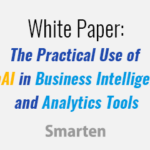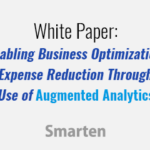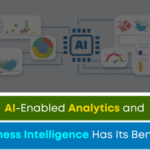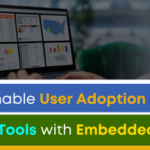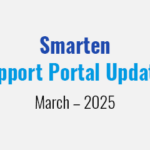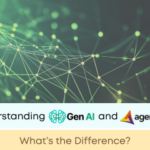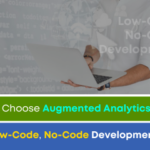In this article, we will discuss the Binary Logistic Regression Classification method of analysis, and how it can be used in business.
What is Binary Logistic Regression Classification?
Logistic regression measures the relationship between the categorical target variable and one or more independent variables. It is useful for situations in which the outcome for a target variable can have only two possible types (in other words, it is binary). Binary Logistic Regression Classification makes use of one or more predictor variables that may be either continuous or categorical to predict the target variable classes. This technique helps to identify important factors (Xi) impacting the target variable (Y) and also the nature of the relationship between each of these factors and the dependent variable.
Let’s look at an example of Binary Logistic Regression analysis, involving the potential for loan default, based on factors like age, marital status and income.
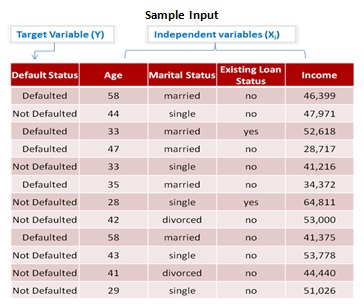
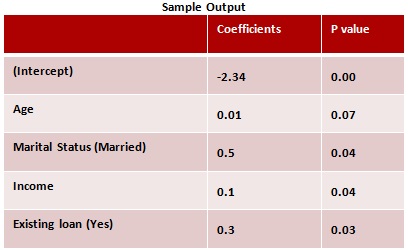
P value for marital status, income and existing loan is <0.05; so these variables are important factors for predicting the likely default/non default class. But the p value for Age is >0.05 which means that Age does not significantly impact the potential for loan default.
How is Binary Logistic Regression Classification Used in Analysis?
Let’s look at two use cases where Binary Logistic Regression Classification might be applied and how it would be useful to the organization.
Use Case – 1
Business Problem: A bank loans officer wants to predict if loan applicants will be a bank defaulter or non defaulter based on attributes such as loan amount, monthly installments, employment tenure, how many times has the applicant been delinquent, annual income, debt to income ratio etc. Here the target variable would be ‘past default status’ and predicted class would include values ‘yes or no’ representing ‘likely to default/unlikely to default’ class respectively.
Business Benefit: Once classes are assigned, the bank will have a loan applicant dataset with each applicant labeled as “likely/unlikely to default. Based on these labels, the bank can easily make a decision on whether to give a loan to an applicant and the credit limit and interest rate each applicant is eligible for based on the amount of risk involved.
Use Case – 2
Business Problem: A doctor wants to predict the likelihood of a successful treatment of a new patient condition based on various attributes of a patient such as blood pressure, hemoglobin level, blood sugar level, name of a drug given to patient, name of treatments given to the patient etc. Here the target variable would be ‘past cure status’ and the predicted class would contain values ‘yes or no’ meaning ‘prone to cure/not prone to cure’ respectively.
Business Benefit: Given the heath profile of a patient and the recent treatments and drugs taken by him/her, the doctor can predict the probability of a cure and identify necessary changes to treatment and drug recommendations.
Binary Logistic Regression is useful in the analysis of multiple factors influencing a negative/positive outcome, or any other classification where there are only two possible outcomes.
The Smarten approach to augmented analytics and modern business intelligence focuses on the business user and provides tools for Advanced Data Discovery so users can perform early prototyping and test hypotheses without the skills of a data scientist. Smarten Augmented Analytics tools include assisted predictive modeling, smart data visualization, self-serve data preparation, Clickless Analytics with natural language processing (NLP) for search analytics, Auto Insights, Key Influencer Analytics, and SnapShot monitoring and alerts. These tools are designed for business users with average skills and require no specialized knowledge of statistical analysis or support from IT or data scientists. Businesses can advance Citizen Data Scientist initiatives with in-person and online workshops and self-paced eLearning courses designed to introduce users and businesses to the concept, illustrate the benefits and provide introductory training on analytical concepts and the Citizen Data Scientist role.
The Smarten approach to data discovery is designed as an augmented analytics solution to serve business users. Smarten is a representative vendor in multiple Gartner reports including the Gartner Modern BI and Analytics Platform report and the Gartner Magic Quadrant for Business Intelligence and Analytics Platforms Report.



